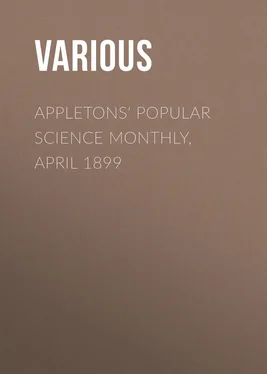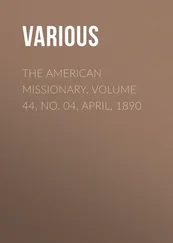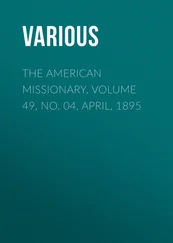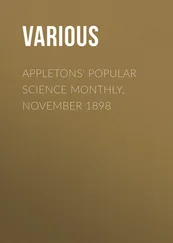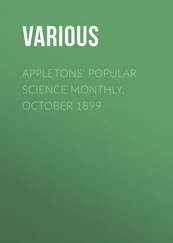Various - Appletons' Popular Science Monthly, April 1899
Здесь есть возможность читать онлайн «Various - Appletons' Popular Science Monthly, April 1899» — ознакомительный отрывок электронной книги совершенно бесплатно, а после прочтения отрывка купить полную версию. В некоторых случаях можно слушать аудио, скачать через торрент в формате fb2 и присутствует краткое содержание. Издательство: Иностранный паблик, Жанр: periodic, foreign_edu, на английском языке. Описание произведения, (предисловие) а так же отзывы посетителей доступны на портале библиотеки ЛибКат.
- Название:Appletons' Popular Science Monthly, April 1899
- Автор:
- Издательство:Иностранный паблик
- Жанр:
- Год:неизвестен
- ISBN:нет данных
- Рейтинг книги:5 / 5. Голосов: 1
-
Избранное:Добавить в избранное
- Отзывы:
-
Ваша оценка:
- 100
- 1
- 2
- 3
- 4
- 5
Appletons' Popular Science Monthly, April 1899: краткое содержание, описание и аннотация
Предлагаем к чтению аннотацию, описание, краткое содержание или предисловие (зависит от того, что написал сам автор книги «Appletons' Popular Science Monthly, April 1899»). Если вы не нашли необходимую информацию о книге — напишите в комментариях, мы постараемся отыскать её.
Appletons' Popular Science Monthly, April 1899 — читать онлайн ознакомительный отрывок
Ниже представлен текст книги, разбитый по страницам. Система сохранения места последней прочитанной страницы, позволяет с удобством читать онлайн бесплатно книгу «Appletons' Popular Science Monthly, April 1899», без необходимости каждый раз заново искать на чём Вы остановились. Поставьте закладку, и сможете в любой момент перейти на страницу, на которой закончили чтение.
Интервал:
Закладка:
There is one other general characteristic of dreams that is worth noting, because its significance is not usually recognized. In dreams we are always reasoning. It is sometimes imagined that reason is in abeyance during sleep. So far from this being the case, we may almost be said to reason much more during sleep than when we are awake. That our reasoning is bad, even preposterous, that it constantly ignores the most elementary facts of waking life, scarcely affects the question. All dreaming is a process of reasoning. That artful confusion of ideas and images which at the outset I referred to as the most constant feature of dream mechanism is nothing but a process of reasoning, a perpetual effort to argue out harmoniously the absurdly limited and incongruous data present to sleeping consciousness. Binet, grounding his conclusions on hypnotic experiments, has very justly determined that reasoning is the fundamental part of all thinking, the very texture of thought. It is founded on perception itself, which already contains all the elements of the ancient syllogism. For in all perception, as he shows, there is a succession of three images, of which the first fuses with the second, which in its turn suggests the third. Now this establishment of new associations, this construction of images, which, as we may easily convince ourselves, is precisely what takes place in dreaming, is reasoning itself.
Reasoning is a synthesis of images suggested by resemblance and contiguity, indeed a sort of logical vision, more intense even than actual vision, since it produces hallucinations. To reasoning all forms of mental activity may finally be reduced; mind, as Wundt has said, is a thing that reasons. When we apply these general statements to dreaming, we may see that the whole phenomenon of dreaming is really the same process of image-formation, based on resemblance and contiguity, which is at the basis of reasoning. Every dream is the outcome of this strenuous, wide-ranging instinct to reason. The supposed "imaginative faculty," regarded as so highly active during sleep, is simply the inevitable play of this automatic logic. The characteristic of the reasoning of dreams is that it is unusually bad, and this badness is due chiefly to the absence of memory elements that would be present to waking consciousness, and to the absence of sensory elements to check the false reasoning which without them appears to us conclusive. That is to say – to fall back on the excellent generalization which Parish has elaborately applied to all forms of hallucination – there is a process of dissociation by which ordinary channels of association are temporarily blocked and the conditions prepared for the formation of the hallucination. It is, as Parish has argued, in sleep and in those sleep-resembling states called hypnagogic that a condition of dissociation leading to hallucination is most apt to occur.
The following dream illustrates the part played by dissociation: A lady dreamed that an acquaintance wished to send a small sum of money to a person in Ireland. She rashly offered to take it over to Ireland. On arriving home she began to repent of her promise, as the weather was extremely wild and cold. She began, however, to make preparations for dressing warmly, and went to consult an Irish friend, who said she would have to be floated over to Ireland tightly jammed in a crab basket. On returning home she fully discussed the matter with her husband, who thought it would be folly to undertake such a journey, and she finally relinquished it, with great relief. In this dream – the elements of which could all be accounted for – the association between sending money and postal orders which would at once occur to waking consciousness was closed; consciousness was a prey to such suggestions as reached it, but on the basis of these suggestions it reasoned and concluded quite sagaciously. The phenomena of dreaming furnish a delightful illustration of the fact that reasoning, in its rough form, is only the crudest and most elementary form of intellectual operation, and that the finer forms of thinking only become possible when we hold in check this tendency to reason. "All the thinking in the world," as Goethe puts it, "will not lead us to thought."
It is in such characteristics as these – at once primitive, childlike, and insane – that we may find the charm of dreaming. In our sleeping emotional life we are much more like ourselves than we are in our sleeping intellectual life. It is a mistake to imagine that our moral and æsthetic instincts are abolished in dreams; they are often weakened, but by no means abolished. Such a result is natural when we remember that our emotions and instincts are both more primitive and less under the dominion of the external senses than are our ideas. Yet in both respects we are removed a stage backward in our dreams. The emotional intensity, the absurd logic, the tendency to personification – nearly all the points I have referred to as characterizing our dreams – are the characteristics of the child, the savage, and the madman. Time and space are annihilated, gravity is suspended, and we are joyfully borne up in the air, as it were, in the arms of angels; we are brought into a deeper communion with Nature, and in his dreams a man will listen to the arguments of his dog with as little surprise as Balaam heard the reproaches of his ass. The unexpected limitations of our dream world, the exclusion of so many elements which are present even unconsciously in waking life, imparts a splendid freedom and ease to the intellectual operations of the sleeping mind, and an extravagant romance, a poignant tragedy, to our emotions. "He has never known happiness," said Lamb, speaking out of his own experience, "who has never been mad." And there are many who taste in dreams a happiness they never know when awake. In the waking moments of our complex civilized life we are ever in a state of suspense which makes all great conclusions impossible; the multiplicity of the facts of life, always present to consciousness, restrains the free play of logic (except for that happy dreamer, the mathematician) and surrounds most of our pains and nearly all our pleasures with infinite qualifications; we are tied down to a sober tameness. In our dreams the fetters of civilization are loosened, and we know the fearful joy of freedom.
At the same time it is these characteristics which make dreams a fit subject of serious study. It was not until the present century that the psychological importance of the study of insanity was recognized. So recent is the study of savage mind that the workers who have laid its foundation are yet all living. The systematic investigation of children only began yesterday. To-day our dreams begin to seem to us an allied subject of study, inasmuch as they reveal within ourselves a means of entering sympathetically into ideas and emotional attitudes belonging to narrow or ill-adjusted states of consciousness which otherwise we are now unable to experience. And they have this further value, that they show us how many abnormal phenomena – possession, double consciousness, unconscious memory, and so forth – which have often led the ignorant and unwary to many strange conclusions, really have a simple explanation in the healthy normal experience of all of us during sleep. Here, also, it is true that we ourselves and our beliefs are to some extent "such stuff as dreams are made of."
The harmonious and equitable evolution of man, says President Dabney, of the University of Tennessee, "does not mean that every man must be educated just like his fellow. The harmony is within each individual. That community is most highly educated in which each individual has attained the maximum of his possibilities in the direction of his peculiar talents and opportunities."
THE BEST METHODS OF TAXATION
This historical survey of tax experience among peoples widely differing in their economic condition and social relations, and this examination of the scope and practice of taxation, with especial reference to the tax systems of the United States as defined and interpreted by judicial authority, prepare the way for a discussion of the best methods of taxation for a country situated as is the United States. General as are the theoretical principles underlying taxation, the application of these principles to existing conditions must be modified to meet the long usage and inherited prejudice of the people, and the form of production or manner of distributing wealth. This holds true in the face of appearances so opposed to it as to defy definition and acceptance. No less promising field for an income tax can be pictured than British India, and few more promising fields than France. Yet India has borne such a tax for years, while France will not permit a true tax on income to be adopted as a part of its revenue system. In the latter country the plea is made that the upper and middle classes already pay under other forms of taxation more than their due proportion of the public burdens, and an additional and necessarily discriminating duty laid upon them will only make this inequality the greater. Class interest may thus oppose its veto to a change that promises to reduce the burdens of one class of taxpayers at the expense of another; or may even oppose a change that offers the chance of collecting a larger revenue with less real difficulty and sacrifice on the part of the taxed. No opposition can set aside even temporarily the great rules that clearly define a tax from tribute, a legal and beneficial taking by the state of a certain part of the public wealth from a demand that involves waste or mischievous expenditure, for which the state or people derive no advantage commensurate with the cost, or from which individuals obtain a gain not defensible in justice, and at the expense of only one part of the community.
Читать дальшеИнтервал:
Закладка:
Похожие книги на «Appletons' Popular Science Monthly, April 1899»
Представляем Вашему вниманию похожие книги на «Appletons' Popular Science Monthly, April 1899» списком для выбора. Мы отобрали схожую по названию и смыслу литературу в надежде предоставить читателям больше вариантов отыскать новые, интересные, ещё непрочитанные произведения.
Обсуждение, отзывы о книге «Appletons' Popular Science Monthly, April 1899» и просто собственные мнения читателей. Оставьте ваши комментарии, напишите, что Вы думаете о произведении, его смысле или главных героях. Укажите что конкретно понравилось, а что нет, и почему Вы так считаете.
